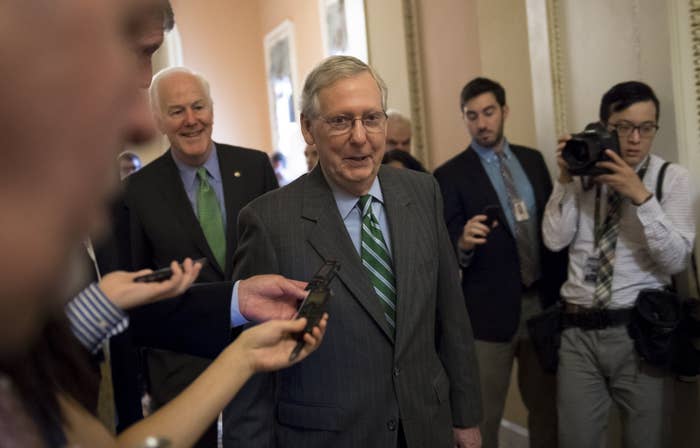
About 28,600 more people could die every year in the US if a proposed Senate health care bill becomes law, suggests a review of medical studies released on Monday.
“Being uninsured can be lethal,” review author Steffie Woolhandler of City University of New York told BuzzFeed News.
Congress is in the middle of efforts to pass a Republican health care plan. The House has already passed its own version of health care legislation, while the Senate released its own draft Senate bill last week and unveiled an updated version earlier today. The Congressional Budget Office released an analysis late Monday finding the Senate bill would save $321 billion over the next decade at a cost of 22 million more uninsured people than under Obamacare by 2026.
"A little negotiation, but it's going to be very good," President Trump said of the bill on Thursday, when it was first unveiled.
Whether removing all those people from medical coverage, and cutting their access to preventive care for diseases such as diabetes, high blood pressure, or cancer, would actually lead to more deaths has emerged as a point of contention in debate over repealing Obamacare, which has enrolled about 20 million people in health insurance and Medicaid plans since 2010.
GOP congressman: “Nobody dies because they don’t have access to health care" https://t.co/gsjpFBlRey
In reality, people without health insurance face odds ranging from 3% to 29% higher of dying prematurely compared to someone who has health insurance, concludes the Annals of Internal Medicine review. Taking the midpoint of those odds as a benchmark, Woolhandler suggested that about 1,300 people a year die prematurely every year in the US for every 1 million people who lose health insurance.
Obamacare, which added about 20 million people to the ranks of the insured, likely preserved lives at that same rate, she said.
“This review is sensible and, I think, comes to the right conclusion: health insurance reduces mortality,” health economist Andrew Goodman-Bacon of Vanderbilt University told BuzzFeed News by email. But he cautioned against drawing exact numbers from mortality estimates, because different states will changes rules for access to Medicaid in different ways, and premium increases will similarly vary.
“Research on this finds that poorer people — who face more risk factors and use different amounts and types of medical care — seem to benefit the most [from gaining health insurance],” he added.
In the review, Woolhandler and her colleague David Himmelstein of Harvard Medical School combined 51 studies on the health effects of losing health insurance conducted since 2002, the year a landmark Institute of Medicine report found about 18,000 excess deaths a year due to people lacking health insurance, largely among cancer patients.
The basic way that health insurance saves lives is by offering people lower-cost preventive care — for example, controlling blood pressure — before ailments turn deadly or dangerous.
“While it’s impossible to offer any specific number with a great deal of confidence, the studies do indicate that coverage losses of this magnitude could leads to deaths in the tens of thousands,” Benjamin Sommers of the Harvard T. H. Chan School of Public Health told BuzzFeed News. A review he cowrote last week in the New England Journal of Medicine came to similar conclusions, also finding that providing people health insurance through Medicaid was cheaper than other measures taken in workplace safety and environmental protection to save lives.
“It’s probably cheaper to give people health insurance in the end too, and it is certainly more humane,” Woolhandler said.
Worth noting, the American College of Physicians, which publishes the journal that released the review, has opposed Republican efforts to repeal Obamacare, joining the American Medical Association and the National Association of Medicaid Directors among medical groups criticizing the Senate's draft bill. Woolhandler and Himmelstein served as unpaid advisers to Sen. Bernie Sanders' presidential campaign and founded a doctors organization that advocates for universal health care.

